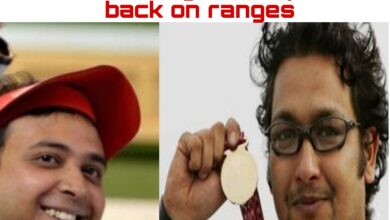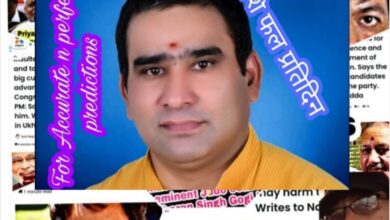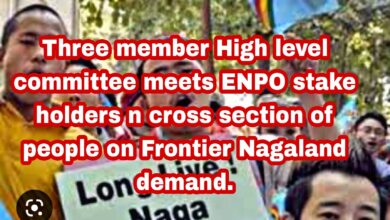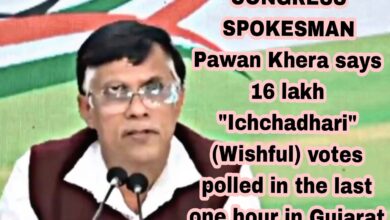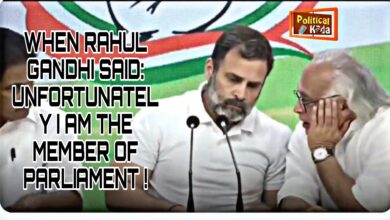Nation and Uttarakhand remembers Veer Chandra Singh Garhwali on his death anniversary who refused to fire on unarmed Pathans!
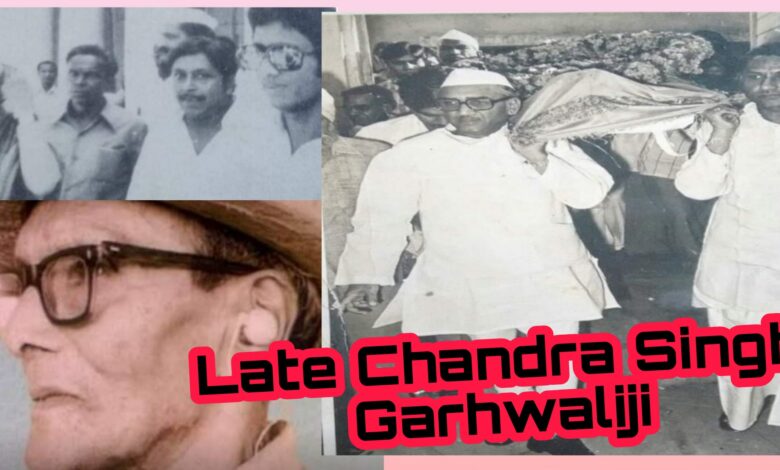
First October is the death anniversary of eminent freedom fighter, revolutionary and progressive ideological icon who never compromised with imperialist Britishers but refused to fire on unarmed Pathan freedom fighters and fought the neo colonialists relentlessly going to jail for more than eleven years including solitary confinement for major part of his sentences.
The name of eminent freedom fighter, revolutionary and the hero of 1930 Peshavar mutiny Veer Chandra Singh Garhwali is etched in the annals of Indian history in golden letters.
Born on 24 th December 1891 in village Meason, Patti Chauthan, Tehsil Thalisain District Garhwal the actual name of Veer Chandra Singh Garhwali was Chandra Singh Bhandari. He left for his eternal journey on 1st October 1979 after suffering from protracted illness in Dr. Ram Manohar Lohia Hospital at the age of 90.
Earlier a dedicated Congressman, he lateron joined Communist Party of India and was a leftist till his death having contested the assembly election from Chaundkot Pauri Garhwal holding a ” bhompu” , campaigning singularly, going village to village with no financial means, as an independent candidate only to be defeated.
By nature he was a real “Fakkad”, ( freak) a man of principles, obstinate and anti establishment in attitude, who never compromised for power and positions despite the fact that he was even offered political positions and ministry by the then prime minister Pandit Jawahar Lal Nehru.
I fondly remember to have met him while he was on bed at the house of Comrade Kalyan Singh Rawat under treatment at North Avenue MP staff quarters, later on admitted in Dr. Ram Manohar Lohia hospital where he breathed his last.
I am witness to his last “Shav Yatra”, when then union finance minister minister Hemwati Nandan Bahuguna and several leaders of Communist Party, including Congressman marched to the Communist Party’s office in New Delhi where he was laid down for people’s “darshan” to pay their last respects n tributes , finally given a last adieu at electric crematorium amid slogans of amar rahen and lal Salam to comrade Veer Chandra Singh Garhwali.
The communist Party of India leader C Rajeshwar Rao, the then general secretary of CPM, EMS Namboodiripad and late prime minister Indira Gandhi, Hemvati Nandan Bahuguna and several important personalities had come there to pay their last floral tributes to this great freedom fighter and revolutionary.
Condemned to solitary confinement in several jails for several years Veer Chandra Singh Garhwali was the very first revolutionary who actually sparked the light for freedom struggle in the country under tyrannical British rule when on 23 rd April 1930 he unambiguously with immense courage and patriotic fervour, refused to obey the orders of the then General Rickett to fire on the unarmed Pathan freedom fighters called “Khudai kidmetgaars” at Kissakhani Bazaar in Peshawar led by the towering Pathan leader and freedom fighter later known as frontier Gandhi, Khan Abdul Gaffar Khan.
The Garhwal platoon was led by none other than Veer Chandra Singh Garhwali to counter the Khudai Kidmetgaars who were protesting the British rule demanding freedom at Kissakhani Bazaar, Peshawar. There were 72 jawans led by Veer Chandra Singh Garhwali.
When infuriated n angered General Rickett ordered with a strong voice “Garhwali fire” along with his platoon pointing their rifles towards hundreds of peacefully protesting Pathans, Chandra Singh Garhwali without caring for the deadly and drastic consequences openly violated his orders and ordering his platoon “ceasefire Garhwalis”,in loud thundering voice, ordering to withdraw firing.
He historically avoided happening a next major Jalianwala Bagh massacre that happened in 1919.
The Garhwali platoon led by Veer Chandra Singh Garhwali threw their arms and refused to fire on unarmed Pathan freedom fighters led by Frontier Gandhi, not caring for the severe consequences.
The awestruck British officers, especially General Rickett were badly demoralised, never ever expected anyone of the Junior rank of Chandra Singh Garhwali and his platoon openly disobeying the British under whose colonial rule the sun never set in the entire world and whose terror reigned everywhere, nobody daring to Revolt against them.
Chandra Singh Garhwali and his platoon soldiers were arrested, handcuffed and cases of treason inviting death sentence launched against them putting them all in solitary confinement.
The entire battalion was confined to solitary confinement in Abbottabad, Peshawar with cases of treason registered against them and Chandra Singh Garhwali’s death sentence converted to rigorous life imprisonment. 16 others were awarded protracted rigorous imprisonment and 39 court marshalled and terminated from services. This imprisonment was awarded by the then military court on 13 th June 1930.
The imperialists British want to hang them till death as this was the greatest act of treason for Britishers after 1857, who want to crush this revolt by all means, fearing its sparks spreading once again, all around the country, enabling n inspiring others too – standing against the British tyrannical rule.
It is said that this revolt spread like wildfire fire in entire country and people were mobilised nationally.
Meanwhile – an eminent barrister of Garhwal, Uttarakhand primarily from Kotdwar who was England return known as Barrister Mukandilal fought Veer Chandra Singh Garhwali n his platoon’s case free of cost as a mark of tribute to these freedom fighter revolutionaries and after incessant debates in court was able to decrease n convert their death sentence to life imprisonment.
Veer Chandra Singh Garhwali spent eleven years four months of stringent punishments in various jails of Abattabad now in Pakistan, Dera Ismail Khan, Bareilly, Nainital, Lucknow, Almora and Dehradun suffering immense torture with his family suffering badly.
After being in solitary confinement for several years in different jails he was finally freed on 26 th September 1941. However, once a revolutionary always a revolutionary Veer Chandra Singh Garhwali met Subhash Chandra Bose while in Lucknow jail. But in 1942 he was again arrested by the British and jailed for 7 years confronting physical thrashing n tortures finally released in 1945 but restricted entry in Garhwal.
Therefore he went to Haldwani in 1944 with his family finally joining Communist party being welcomed by various groups of freedom fighters and people of Kumaon division. He also went to Lahore and acknowledged a tumultuous welcome. He participated in the Tehri Jan Kranti against the then Rajshahi and after eminent revolutionary Nagendra Saklani’s martyrdom he led the movement fulfilling his unfinished task.
The then chief minister of Uttar Pradesh Hemwati Nandan Bahuguna 1974 using his discretionary powers allotted a huge tract of land to Chandra Singh Garhwali at Haldughati, Kotdwar, Garhwal by relaxing the rules. However, till date the government of Uttarakhand had not given the land allotted to them by H. N. Bahuguna in Haldhughat , Kotdwar the official recognition leading to the troubled family receiving eviction orders and confronting legal threatd.
Kindly recall that when the first world War was announced,Veer Chandra Singh Garhwali was 22 years old.
According to the book authored by eminent writer and former union education minister Bhakta Darshan Singh during those times the British started admitting youngman in their army.
A constable reached Veer Chandra Singh Garhwali’s village and asked him to avail the opportunity to join the British Army.
Due to abject poverty Chandra Singh Garhwal do not want to lose this golden opportunity and followed the constable via Dhaijuli and Pauri to Lansdowne on foot without seeking permission from his family.
On 11 th September, 1914 he was admitted in 2/3 Garhwal Rifles. Being healthily sound he was rendered physical training of nine months which he passed conveniently and enrolled permanently in Garhwal Riffles 6 th company’s 12 th section. Being very energetic and talkative he was called “Chandribhaat”.
In 1915 he participated in the war with friendly countries in Europe and central areas. He participated in Mesopotamia war in 1917. During 1921 to 1923 the British were involved with Pathans in a massive war.
Highly influenced by Gandhi Chandra Singh Garhwali started participating in Satyagrahas since 1920 led by Gandhiji. In 1929 Gandhiji arrived at Kumaon. He went to Bageshwar while on leave to meet Gandhiji.
Immensely inspired by Gandhiji , Garhwali pledged to do something constructive for the nation to free it from foreign tyrannical shackles of the cruel British imperialist rule.
After independence and even before, freedom fighter and revolutionary Chandra Singh Garhwali met Gandhiji and Jawahar Lal Nehru at Allahabad and stayed at Anand Bhawan n Vardha Ashram too with his family for several months.
After being freed from various prisons Chandra Singh Garhwali was restricted by the British from going to Garhwal.
Hence he was constrained to go to Allahabad, Anand Bhawan and Vardha Ashram, Gujarat meeting Nehru and Gandhiji to seek help for his destabilized family in financial doldrums.
He was even offered ministership by Nehruji but he refused the offer and latter on joined Communist Party of India, preferring a life of a struggling fighter against capitalist tendencies for the poor, down trodden and hapless. The then prime minister Indira Gandhi also had high regards for him but sorry to say that no government came to his rescue when he was alive nor his family was helped by either central or successive state governments of Uttarakhand except the then UP CM Hemwati Nandan Bahuguna.
His family always remained in financial doldrums and no government could give them any benefit due to them for such a great sacrifice for the nation.
Just two years ago his family living in poverty in Haldhukhata, Kotdwar was issued notice with the state government coming to their rescue after the matter was highlighted in the social media. Salutes to Veer Chandra Singh Garhwali, the first hero of the revolutionary act in India. Jai Hind.

